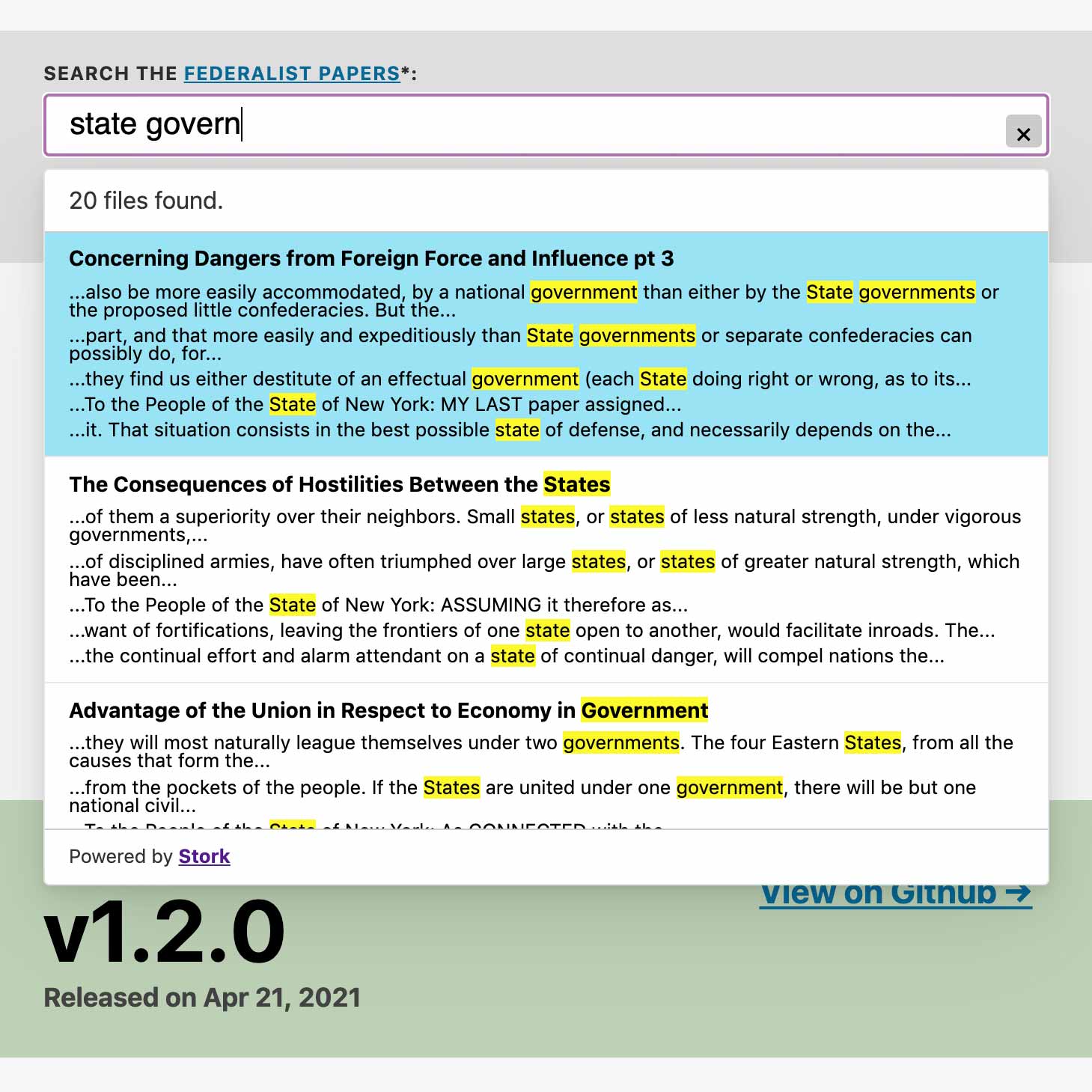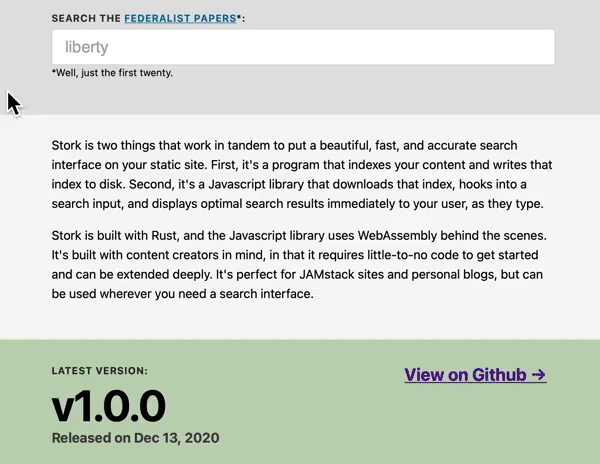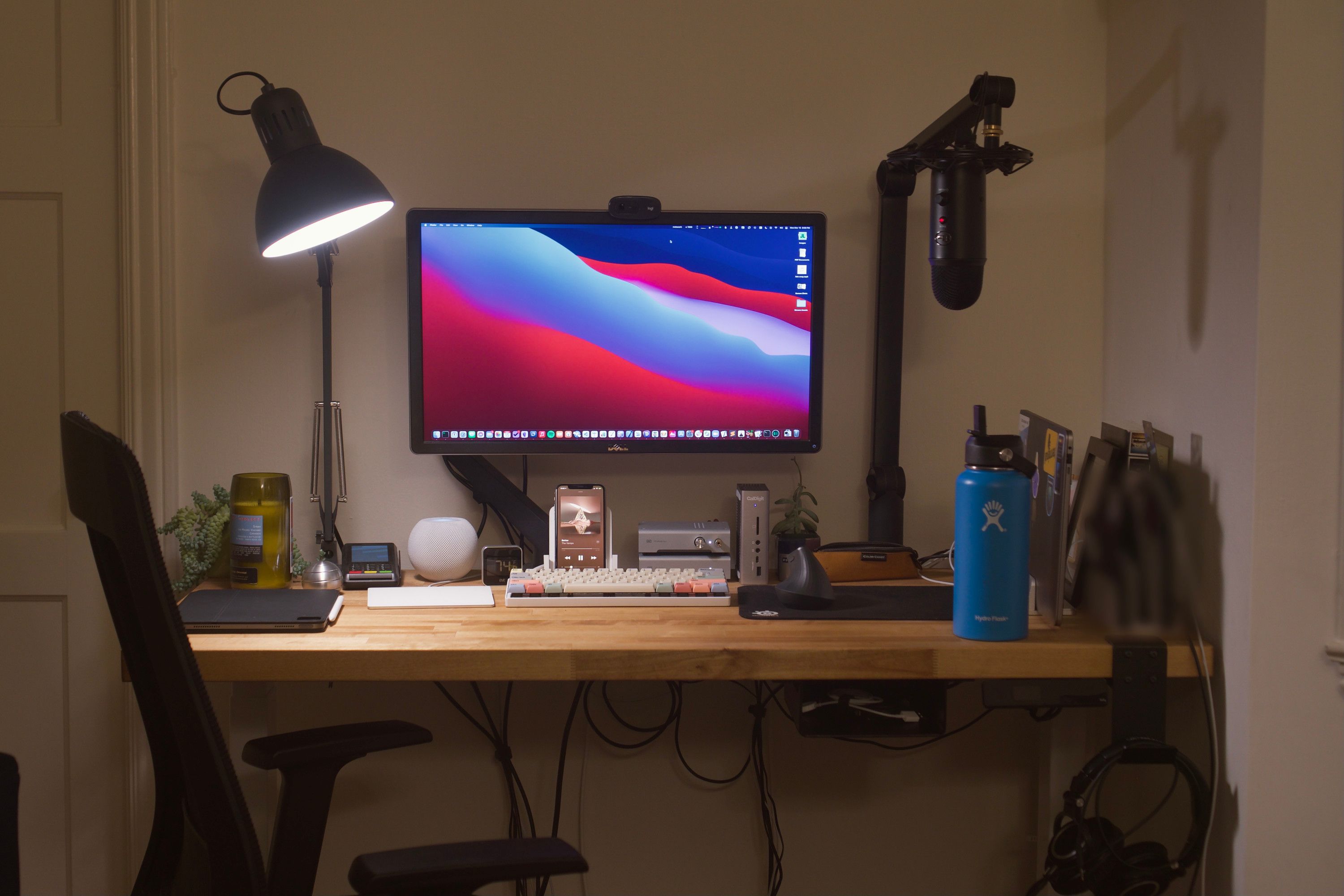Console
Interview with
James Little
Creator, Stork Search
A full-text search tool for static websites.




What is Stork Search? Why did you build it?
Stork Search is a free open-source full-text search tool primarily for static websites. If you give it a corpus of content, it will build a search index file that you can upload to a web server or a CDN. Then, it provides a JavaScript library that will analyze that index file and build a rich, search-as-you-type, full-text search interface for you.
I built it for static websites, but it's usable for a lot of different types of websites: sites that follow the Jamstack philosophy primarily, but also WordPress or Ghost blogs, even video or podcast sites. Stork has full support for subtitle files. You can give Stork a bunch of subtitle files and when you search for a word that is in a video or a podcast, you can set it up so it will link directly to that timestamp.
There are two parts to Stork. First is the command line tool that builds the index. Second is the JavaScript library which loads up a WebAssembly binary. The WebAssembly binary and the command line tool are built from the same Rust code base. It's just two different compilation targets.
One of the driving concepts behind Stork was if you have a limited corpus of text, you can precompute search results for any query ahead of time. There's a lot of work that goes into optimizing what actually gets stored in the index file versus what the web assembly binary is doing as pre-processing. There's no actual search algorithmic work going on once you're in the web assembly binary. It's just looking up from a hash table that is encoded in the index.
Basically any site that doesn't update too frequently is a good candidate for use with Stork. Any site that has a moderate amount of text content that you can search through and where that text content is addressable by URLs will work. You can build the index as part of a build process, or even just on your own laptop if it's not changing frequently.
I have been doing web work for a long time. I'm completely bought into the Jamstack style of web development, but I never really found a search solution that I was excited about using. They all have their own problems, so I built Stork to be a modern, forward-thinking search tool with the best interface and developer experience that I could design.

Stork Search demonstration.
Why did you write it in Rust?
This is my first Rust project. I had played around with the language a little bit, but Stork is the first thing I really built and went all in for, mostly out of necessity. I knew I wanted to use WebAssembly. The whole impetus of the project was that WebAssembly will make this kind of computation fast and doable.
At that point there were two languages that could easily compile into a WebAssembly binary: Rust and Go, and I chose Rust. I liked the syntax and the community more. There's so much tooling in the Rust community for turning your Rust program into a WebAssembly program. The people behind Rust and the WebAssembly working group are really smart, and I'm lucky that they've done all the work for me, so I don't really have to think about WebAssembly as a compilation target. I just compile it and know that it works.
I think picking Rust was the right choice, and it has been fun to explore the hidden depths of the language via this project.
What does a "day in the life" look like?
Stork Search is an open-source side project, so Monday through Friday, 9am to 5pm, I'm at my day job at Stripe. When I do get a chance to work on Stork. I want to keep a close eye on GitHub issues and discussions. There is a fledgling community growing around Stork, and I want to make sure that I'm fanning that flame wherever I can, helping people out.
Part of working on this is that I get to decide what the community ‘feel’ is like, and I want it to be a very personal thing. For example, in the footer of every Stork Search web page it says, "I'm very excited that you're here. Thank you for checking it out" and that's the mentality that I want to bring to any of the community interactions.
A lot of what I do is around planning: What features should I build, what bugs should I fix, what do users want, and how can I build the best search tool that I can? As I have limited time, planning is super important for this kind of project. If I've planned everything out nicely and I know what I want to build, I might spend an hour or two in the evening writing some code or documentation. At weekends I get to spend a little bit more time.
One thing that I've been playing with recently is streaming development on Twitch. I think it's a good way of introducing the code base to people. It's something that I've never really done in my development practices before: live coding, live explaining what I'm doing. It's a lot harder than it looks, but it's been a fun exercise and definitely something that I want to keep doing and keep growing.
How did you first get into software development?
When I was a kid, I loved playing little Flash games - like platformers. I have an uncle who is in technology, and I think he wanted to take the energy I put into playing Flash platformers and turn it towards exploring how websites are built. He taught me how to set up an HTML project on the Windows XP computer that my family had at the time. He bought me an HTML for kids book when I was around seven years old.
It was a hobby that I quickly realized I wanted to keep spending more and more time doing. I learned about PHP when I wanted to make the sites I built a little bit more dynamic. Really, I didn't want to write the same navigation header a dozen different times for a dozen different HTML pages, so PHP’s include directive became magical for me.
I took programming classes in high school - I was lucky to go to a high school that offered that sort of thing. This class had me programming games in Java applets, so I think the first repositories on my GitHub profile are Pong and Asteroids! Later I went to major in computer science at college, and that gets us to where we are now.
What is the most interesting development challenge you've faced working on Stork Search?
The challenge with Stork has mostly been centered around designing the developer and end user experience. How does it feel as the developer building a search index, and how does it feel if you're the person coming to the website trying to search for something? That's the experience that I wanted to hone throughout the development process.
Working with Rust is tricky, too. If you haven't played with it for long, things like figuring out the lifetimes of my data and modeling how it transforms as it weaves its way through the indexing system has taken me a while
The third challenge has been dealing with data structure design and data compression when building the search index. I want that search index file to be as small as possible, but also to hold as much information as possible, so that it can have the excerpts below the search results to see the context of the thing that you've searched for. Making sure that all of that can get packaged together in a small enough way has been a tricky problem. I don't think I've solved it yet, but it's something that I feel is always at the back of my head: How can I inch a few kilobytes off of my search index?
I tend to think of the search index in the same vein as the images on a site. It's just a bag of bytes and you don't really need to know what's in the bag of bytes, but the browser - or in Stork's case, the JavaScript library - knows what to do with it and can turn it into a search interface on the screen.
What is the most interesting tech you are playing around with at the moment?
I'm lucky to live in an apartment with fast internet speed and a girlfriend who is very patient with me when I want to play around with the home network. This has been a fun distraction for me. I set up a Ubiquiti UniFi network that runs in my apartment. When I completed my computer science degree, I had a very abstract understanding of how networking works, so I've been setting up subnets and VLANs and things like that, actually seeing everything in detail and trying to decide how everything on my network is going to be segmented.
I set up a Pi-hole as a network-wide DNS server to block out ads, which has been nice for when I'm playing Boggle With Friends, which is a very ad-laden mobile game. I also have a 4-bay Synology NAS that is self-hosting some applications, and all of the computers in the apartment back up to it too. It feels a bit like a house of cards that I get to very precariously maintain! It's a fun project.
Describe your computer hardware setup
I am running an M1 Mac mini, which is the first desktop that I've personally ever owned. It's all been laptops before then. I love it. It sits in the corner of my desk and is incredibly quiet and fast. All of the rumors you hear about the M1 computers being shockingly amazing are true.
I have a single monitor. It's a Dell 24-inch 4K thing that I picked up secondhand. I'm using a Logitech MX vertical mouse, after the MX master was hurting my wrist. I have a Vortex POK3R keyboard that I've had for five years at this point. It's got cherry MX clear switches. I use an Apple trackpad so I can do the multi-finger gestures when I need to. And I have an iPhone 10S.
Describe your desk setup

Due to the Coronavirus pandemic, I’m working from home in the corner of my apartment's living room. My desk is a butcher's block that I got from a hardware store that I stained and waxed. I’ve put it on some motorized standing desk legs, so it can raise and lower - I’ve found that I enjoy standing in the morning.
The computer is plugged into a CalDigit dock, which is one of the best things that I've purchased for my setup. It gives me one cable that I can move between computers, and I have a lot of little accessories that I like to keep plugged in, like a Blue Yeti microphone for Zoom calls.
I also have a Magni Modi Schiit Stack as my headphone amplifier and my DAC so I can listen to music through headphones. I also have a HomePod mini also on the desk for when I don't want to put the headphones on and I just want to have something on in the background.
I have a desk lamp with a LIFX bulb that can change colors. I never really change the colors, but it's fun because I'm all in on HomeKit for home automation. I have some NFC tags that I stuck to the underside of my desk, and that lets me wave my phone under my desk and the lights will turn on, which is pretty fun.
Describe your computer software setup
OS: macOS, Big Sur.
Browser: Safari for casual browsing. Firefox for development.
Email: Apple’s Mail.app. It's backed by Gmail but I like having it open as a native app in the background.
Chat: Slack
IDE: VS Code as my main text editor, but I also have Sublime Text and Vim open, and use them for their own separate reasons. iTerm2 is my terminal emulator.
Source control: Git for source control, but I use Tower as a user interface on top of it.
When coding
Daytime or nighttime? Daytime.
Tea or coffee? Coffee.
Silence or music? Music. Usually something pop-y with a good beat.
What non-tech activities do you like to do?
I live in San Francisco near Golden Gate Park. I've been a runner for a while, so I'll go out for a run in the park sometimes. I read a fair amount of books, and I try to alternate between fiction and nonfiction. I'm currently reading The Artist's Way by Julia Cameron. The book introduces the concept of morning notes as a tool for creativity.
During quarantine, I've been taking piano lessons over Zoom, which is an interesting setup. Internet delays don't always make it ideal, but it's something that I did as a kid and was something that I wanted to get back to so that I'm not staring at a screen all the time. It's been fun to play the same songs that I played when I was 10 years old.
Find out more
Stork Search is a full-text search tool for static websites. It was featured as an "Interesting Tool" in the Console newsletter on 14 Jan 2021. This interview was conducted on 10 Mar 2021.
Subscribe to the weekly Console newsletter
An email digest of the best tools and beta releases for developers. Every Thursday. See the latest email